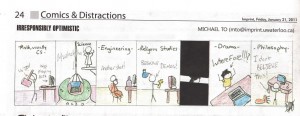Stoicism and Confucianism: the Thread of Society
The Meditations of Marcus Aurelius is the indisputable classic of Stoicism. Similarly, the I Ching has a comparable history in Confucianism, with the Ten Wings being modified by each generation of scholars. The I Ching begins with two symbols, representing Heaven and Earth. Understanding this is the key to the philosophy. The Will of Heaven is done on Earth. One Will, One Universal Cause, and One Purpose that unites all. The Mediations expounds on a similar philosophy: reason governs society, which rules men.
Now the good for the reasonable animal is society; for that we are made for society has been shown above. Is it not plain that the inferior exist for the sake of the superior? But the things which have life are superior to those which have not life, and of those which have life the superior are those which have reason.
Heaven is represented as reason, Earth as society, thus humans are to follow society. When Heaven and Earth come into being, human life begins. The third symbol in the I Ching is appropriately named Beginning. From these three symbols, the ten thousand things follow.
Changes
The I Ching has another name, the Book of Changes. The symbols alternate, with lines changing from yin and yang, representing the interplay of energies. The entire book represents a sequence of changes with each symbol. Within each symbol, the lines show how the situation develops. Thus, the I Ching is a suitable simulation, or conceptual model, of the Universe, as Marcus writes,
Now the universe is preserved, as by the changes of the elements so by the changes of things compounded of the elements.
The Role of Philosophy
Philosophy is not logic. It is a metaphysic of quality. The I Ching is not a book, because it encompasses all things in existence and all that have been or will ever be. Indeed, if one truly knows the essence of the I Ching, all things past and future is not beyond his grasp.
Without going outside his door, one understands (all that takes place) under the sky; without looking out from his window, one sees the Tao of Heaven. The farther that one goes out (from himself), theless he knows.
The sage knows everything, yet perceives nothing. Perception belongs to the realm of time, but Heaven lasts forever. In the realm of time there is philosophy, for without it society has no way to speak of Heaven. There is no justification for the existence of humans other than philosophy, which is why philosophers have always asked for the meaning of life,
Of human life the time is a point, and the substance is in a flux, and the perception dull . . . What then is that which is able to conduct a man? One thing and only one, philosophy. . .
The Nature of Things
The I Ching as an oracle, reveals the true nature of the situation being asked. Each symbol, composed of yin and yang lines, shows how the situation develops. When taken together, they form a picture showing the nature of the situation.
Marcus asks the same questions of himself,
This thing, what is it in itself, in its own constitution? What is its substance and material? And what its causal nature (or form)? And what is it doing in the world? And how long does it subsist?
